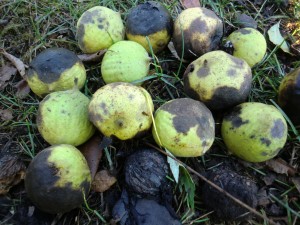Black Walnuts
Black walnut trees (Juglans nigra) are the last trees to arrive in spring and the first trees to leave in the fall. They are known for their highly prized wood and delicious nuts.
Black walnut trees are particular about what plant life is allowed to grow around them. The roots produce a toxic substance called juglone which inhibits certain plants to grow next to it. Tomatoes and earthworms are especially sensitive to juglone poisoning. The wood shavings from black walnuts also suspected of causing acute laminitis in horses. 
If you grow tomatoes, it is important not to plant them in an area where black walnut trees are growing. Any contact with the tree roots can cause the entire plant to wilt; symptoms which can also be mistaken for verticillium wilt. Leaves and nuts also contain juglone and should be avoided in the garden or a composter.
Harvesting nuts:
In early September the tree will drop golf ball size or larger nuts. To get to the nuts, first remove the outer yellow/green husk. If you let the nuts lay around too long, the husks will oxidize; turn black and mushy. One way to remove the husk is to step on the nut and roll it. (Don’t wear good shoes). This will break off the husk. Another faster way is to drive your car tires over them. Wash and rinse the nuts after removing them from the husk. Remove any ‘floaters’ (nuts that have not filled in) and air dry on the lawn in the sun.
WARNING: When handling black walnuts be sure to wear rubber gloves as they will stain your hands and clothes.
Store the nuts in mesh bags or burlap sacks until you’re ready to crack them. It’s better to crack them a few weeks after drying (curing) as the nutmeats shrink up a bit and are easier to remove from the shell. Crack the hard shells with a hammer to remove the nut meats, a regular nut cracker will not work.
The nutmeats can be stored in the refrigerator for up to nine months and 2 years in the freezer.
Black walnuts are more labor intensive than English walnuts and therefore more costly but their distinctive flavor is worth trying.
Black walnut husk juice is colorfast and lightfast; it has been used to make dyes, stains and ink dating back to Medieval times.